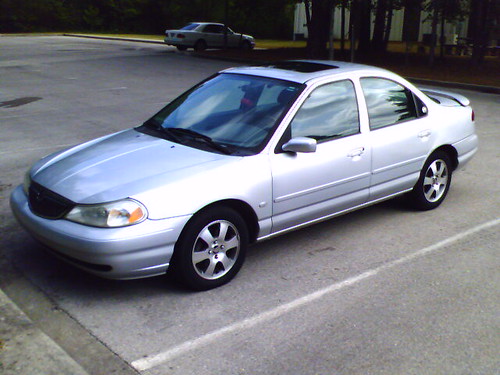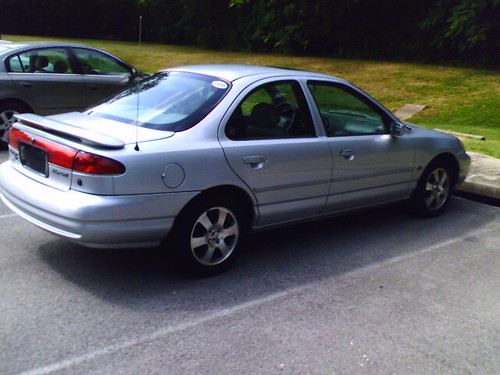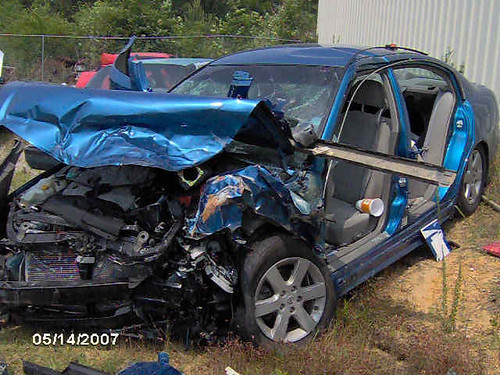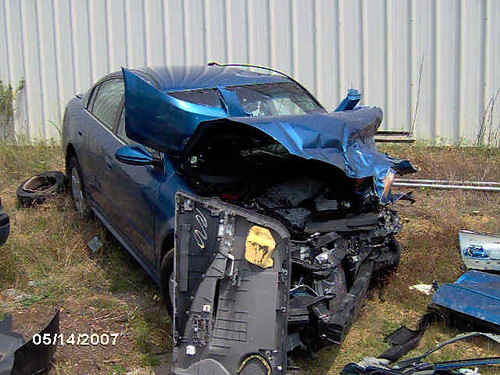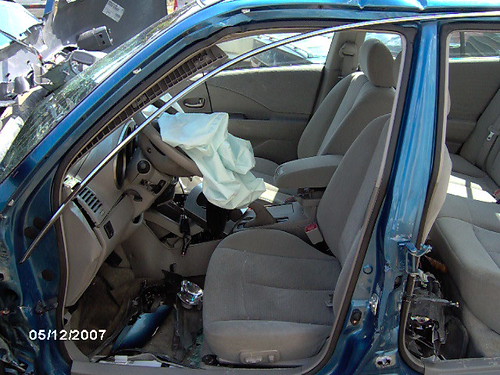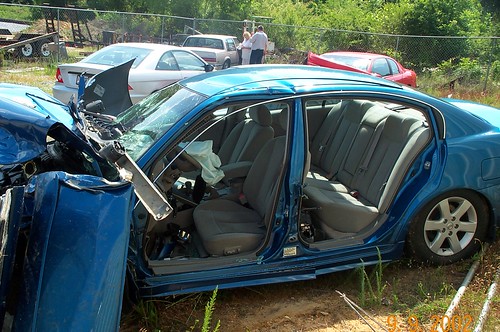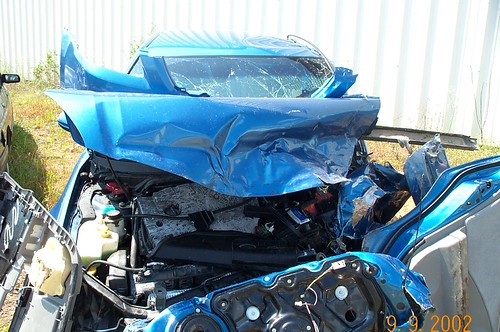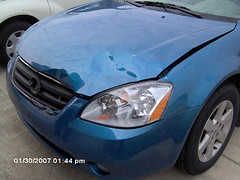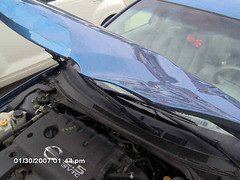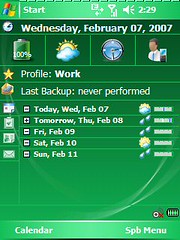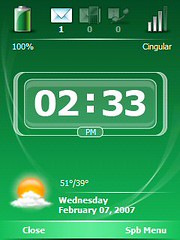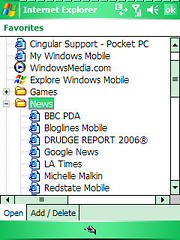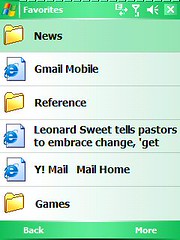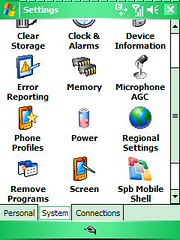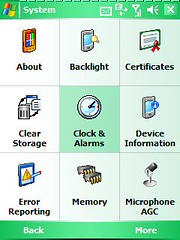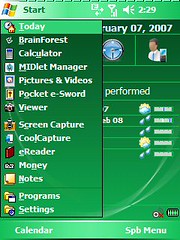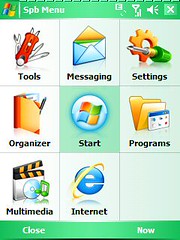The Strike
As a faithful capitalist running dog, having to sympathize with the motivations and actions of a union is almost physically painful to me. So, gentle readers, please understand my position on the strike in that light.
I'm also a technologist, by profession and by avocation. One of the very few constants in my 37 years on the planet has been the rush of technological change: vinyl to eight-track to cassette to CD to MP3; typewriters to text editors to WYSIWYG word processors to HTML web page authoring to blogging; telephones to faxes to e-mail to IM to text messaging; movies to TV to VHS to DVD to streaming video; one gets the idea.
As someone who plans to make at least part of his living through novel advances and publishing royalties in the future, I've watched the Writers' Guild of America (WGA) strike with less than detached interest, and tried to do my homework as regards the players and issues involved.
To wit:
- VHS. The WGA, through gross failures in negotiating, won (through the last writer's strike, the one that fatally wounded Moonlighting) royalties for its members of four 1988 pennies for each VHS tape sold of a writer's movie, accepting the line from studios that "we're unsure how this 'videotape' thing will perform--let us test the waters before we allow you a cut of this experimental thing that may never pan out." Also, VHS tapes were pretty expensive to produce.
- DVD. The WGA in the '90s managed to score residuals on DVD sales of...the exact same four-pennies-per-disc back to the writer. The reasoning for this sad figure, unadjusted at all for the inflation of the intervening years? "We're unsure how this 'DVD' thing will perform--let us test the waters before we allow you a cut of this experimental thing that may never pan out." Oh, and DVDs cost almost nothing to produce when compared to VHS tapes.
- Through the magic of Hollywood accounting, these four-penny units have only occasionally translated into actual money paid. Anecdotally, successful Hollywood writers can go for months or years without encountering another successful Hollywood writer who's actually seen a check for DVD residuals.
- Internet streaming is, within 5 to 10 to 20 years, going to sweep the content industry as its dominant means of distribution. The song from the studios? "We're unsure how this 'Internet' thing will perform--let us test the waters before we allow you a cut of this experimental thing that may never pan out." This time, the deal included no percentage for the writer at all.
No percentage. None, as in when DVDs and high-definition discs go the way of VHS, and Internet download or streaming is all that remains after a movie's or TV show's initial run (presuming it even has one; studios and channel-based TV broadcast are starting to show signs of being in real trouble), the writer will get no compensation for his work. Zero.
The standard rebuttal when unions and union members whine about losing money or jobs to technological progress (I should know, I've used it) is, "Well, technology marches on! Find a way to adapt, to add value, retrain, move to another market segment. Suck it up!"
Sadly, this isn't a case where the jobs writers do are being outsourced, or automated, or somehow have become inherently less valuable. It's an industry collaborating (all six content producing corporations are operating through a single entity, the Alliance of Motion Picture and Television Producers [AMPTP]) to shut writers out of residual compensation for their work, because the work has the misfortune of being distributed via another medium.
Which brings me to e-books.
From Printed Pages per Minute to Downloaded Bits per Second
The paperback industry's days are numbered, according to Jerry Pournelle, a guy who's been writing SF, I think, for more years than I've been alive. His argument goes that the moment a ubiquitous device exists that allows for a comparable reading experience to that of paper, and is cheaper for publishers to use for distribution than dead-tree methods...
...There will come a time when everyone will be carrying an instrument on which one can read a book with about as good an experience as you would have reading a paperback. The instrument will be your telephone and telep0hone book [sic], as well as GPS locator, email access, video and still camera, notebook, and music delivery system. Nearly everyone will have one. Downloading a new book will be painless and cheap.
When that day comes, the paperback book market will implode. Paperback books will no longer be the "mass market" delivery system for entertainment books such as detective stories and science fiction. When that day comes, the entire financial compensation system for authors will change with it.
I own a Sony Reader e-book viewing device and I love it--it's got over 165 e-books on it now, both purchased and public domain. I've got 50 or so e-books on my Cingular 8125 cell phone, and I've carried e-books of one type or another on every PDA or smartphone I've used. I've read thousands of pages, probably hundreds of thousands, on electronic devices over the years. I love e-books.
Sadly, the conventional wisdom (espoused by Pournelle, too) is that only way that e-books (or any digital media) will continue to be reliable moneymakers for their creators and distributors is for them to be digitally locked down. This means digital rights management, or DRM.
Protection, Software and Litigation-Based
A few months back, the Science Fiction and Fantasy Writers of America (SFFWA or SFWA) got into some lamentably hot water when they (quite correctly) served a takedown notice to Scribd.com, a site where people can post any e-text they choose, and which had accumulated an impressive library of pirated e-text versions of books written by authors whose interests were protected by SFWA.
The hot water fell when it came to light that some of the e-texts on the list SFWA posted for takedown were in fact not texts that SFWA was authorized to protect. One of the authors whose works appeared on that list is Cory Doctorow, who wants his work posted everywhere, all the time, for free, and has licensed it accordingly. Doctorow, a notorious loudmouth and pot-stirrer, lambasted SFWA for acting too zealously and precipitously, and the teapot-tempest spread like wildfire.
SFWA apologized, obviously, and wound up disbanding its ePiracy Committee, rendering its protected authors--at least temporarily--less so. In the end SFWA was merely guilty of acting clumsily while doing its job.
Oddly enough, the pirated e-texts on Scribd.com weren't illicitly distributed copies of unprotected e-books, for the most part: they were scans or transcriptions of paper books that were created by ordinary people with either flatbed scanners or lots of time (or lots of friends). It's common knowledge that within hours of the release of Harry Potter and the Deathly Hallows, complete e-text copies of it were circulating, having been scanned and transcribed by networks of thousands of people, each of whom had only to type out and/or proofread a few lines.
So: even in cases where the only legitimate copies of a book are digitally protected, unprotected versions will surface if demand is high enough. I'd venture to say that most paper books with any sort of popularity are available online if one knows in which dark corners to look. So the cat is out of the bag--DRM is at best a holding action.
Contemplating the Shackles: DRM
Because of facts like the ones above I've come down, after much internal wrangling, on the anti-DRM side. Not in the "information wants to be free" info-hippie sense, but in the sense that I despise being treated by my duly-bought media as though I'm a thief. When I'm told by the people from whom I've purchased an e-book that I can read it on this device and not that device, or am treated to an unskippable FBI warning on every DVD, or am prevented from playing Apple iTunes Store media I've paid for on more than five "authorized" computers (happened the other day), and on and on, I feel like I'm being maltreated by the businesses I'm patronizing.
DRM also gives control over the use of content you've paid for to another party, which may change the terms, go out of business, or simply screw up, possibly rendering your content inaccessible. It's happened before: Google discontinued its Google Video service, and was in the process of making its customers' purchases unviewable when consumer outcry pressured Google to offer refunds. Major League Baseball changed its DRM provider, and actually did render its customers' paid-for content inaccessible, no recourse given.
Fortunately, the digital music industry seems to be seeing the light: the EMI label has authorized its titles to be bought without any DRM protection on iTunes and other online music stores, with promising results.
As regards e-books, the people I've seen who've made money by selling unprotected e-books so far seem to fall into categories like authors such as Cory Doctorow and Charles Stross who've already made a name for themselves, or organizations like the Baen Free Library and Fictionwise.com, which offer many unprotected, excellent titles for free or inexpensive download. The theory goes that unprotected e-books in effect serve as elaborate ads for the physical versions of the works involved, and the concept has historically been a mostly sound one: to one degree or another, a paper book will always have advantages over an electronic one.
This situation does raise the question, though: what if the paperback implosion Pournelle foresees above happens, and the only cheap books available are electronic ones? Either every silo-like store from Amazon to Sony and its reading device will need to have all books from all publishers available for download; or (as now and far more likely) some publishers' products will be available through some vendors and some others. Thus the balkanized e-book market will continue to hobble along until the ability to read books on more than one device will eventually win out, and unprotected e-books will eventually win the day.
That, or some licensable DRM protection standard will rise from nowhere and be adopted across many devices. Don't see it happening, though, if the music world and current reader world is any indication. All the e-book reader makers still want the whole pie (c'mon, all you publishers just sell exclusively through us!), even though it ain't gonna happen. Not even for Amazon.
You can always buy another copy, kid.
That's the solution proposed by all content producers in the digital age (as they try not to be seen rubbing their hands in glee): just buy another one! Never mind that one of the benefits of a medium being digital in the first place is perfect reproducibility. Leverage that benefit, for Pete's sake; don't expect us to pay again to re-download the the exact same bits!
There have been occasions in the past where re-buying a work was justifiable to me: the move from VHS to DVD caused me to re-buy several titles, because the DVD format was demonstrably superior for my purposes. Ditto records to cassettes, and cassettes to CDs. Value was added at each change of format.
What I refuse to do is pay for another copy of a work with no value added aside from the accident of the device it's chained to. Music files fail this above added-value test because they sound the same on both an iPod and a Zune. E-books fail the test because the text of Moby Dick will always be the same (or had damned well better be) from edition to edition, analog or digital. Now there may be some published forms of Moby Dick that do add value: lavish tomes with illustrations; leather-bound editions on creamy paper; signed copies by Melville(!). I'll pay extra for, or even re-buy those, but for the simple, elemental text? Nope.
Right now, most of the e-book reading devices on the market (Sony Reader, Kindle, etc.) will display some form of unprotected file: BBeB, Mobipocket, LIT, PDF, RTF, TXT. But if device makers decide to disable or simply not include that functionality on their devices, then we're stuck, and pay-per-device or even pay-per-read may even become the reality. Not for me, thanks.
My own Battle with DRM
I've learned over the years to be a bit cagey about the content I pay for. I always buy music that I'm likely to care about on CD, because it's unprotected and I can thus rip (convert) the high-quality master to whatever format I need for whatever player I choose to use. I've been one of Apple's iPod faithful for some time now, but if the third version of the Zune, or any other player catches my eye after my current iPod bites the dust, then I want the freedom to transfer my faves over to the new unit with as little hassle as possible, or at least without re-buying!
The e-book situation is similar. I was very lucky, for example, that the eReader e-books I'd bought when I was a Palm user were readable on my Windows Mobile device--if the eReader.com company hadn't chosen to make a cross-platform reader application, then that money would have been lost, unless I had chosen to crack the DRM on those e-books--an illegal activity. As it is, I still can't read those books on my Sony Reader, because Sony hasn't made their device compatible with the eReader format.
In the same vein, I have a few titles that I've purchased from the Sony CONNECT e-book store, but except in rare circumstances I've stopped buying there, because Sony's DRM locks their books exclusively to Sony devices, meaning that if I decide to move to another device, my Sony-bought books can't make the trip. The Fictionwise e-book store, by comparison, has more titles, and offers them in both DRMed and unprotected formats. Not all books are available unprotected, but I try to stick with the ones that are, because I know they can be moved among devices.
This is my hedge against the paperback implosion, which I happen to agree with Pournelle will happen sometime in the next five to ten years. I also want to be vendor-proof: if Sony, or Mobipocket, or Amazon tank tomorrow or fifteen years from now I still want to be able to read all my e-books.
Sad, but true: if I'm to be said truly to own content I've paid for, then it needs to be free of digital shackles. I'm not going to share or trade these books; hell, all I want is to be able to read their text on whatever device I've decided will be my reader of choice.
Amazon's Kindle and the Changing Game
Speaking of which, the Kindle is a compelling device. Not because of its looks (it's pug-ugly to my eyes), but because it's the first device to combine an e-ink device with an online e-book store and wireless access. It's also got the ability to enter text for searching, annotating, and other activities that the Sony is unable to match. It will read unprotected Mobipocket and TXT files, too, so those would comprise the majority of the books I'd put on one.
Sadly, the Kindle's just as locked down DRM-wise as the Sony when it comes to purchased e-books. Given that the major feature it offers its its cellular-download capability, I'm not likely to get much out of it considering my anti-DRM stance. Bummer, eh? Unless someone breaks the Kindle's encryption and I choose to use their tool to break the law and strip my purchases' DRM.
Sigh.
Anyhow, my boss at work has ordered a Kindle, and will be bringing it into the office this week. I plan to do my own side-by-side comparison with my Sony, and if I like the device's user interface enough I may actually grab one, allowing Amy to inherit the Sony. Because the wireless functionality is DRM-only, though, I doubt Amazon will be getting much money from me.
Here's hoping the anti-DRM eye-opening occurring in the music world extends to the e-book world soon. Sadly, though, indicators aren't good: Amazon owns (having bought it a year or two ago) the Mobipocket e-book format, but the Kindle won't read protected Mobipocket files (only unencrypted ones). Amazon isn't offering to convert protected Mobipocket books to Kindle format, even those bought from Amazon itself.
Just buy another copy, kid.
-Rich

